Caramel coloring is the single most used food coloring in the world, and a new study shows that beverages with high amounts of this coloring may be carcinogenic.
Consumer Reports tested soft drinks that have caramel coloring and found that some types of the artificial coloring contain a potentially carcinogenic chemical called 4-methylimidazole (4-Mel).
This food coloring is used to make drinks and food turn brown. This report cites a 2007 federal study in which 4-Mel “caused cancer in mice and the International Agency for Research on Cancer determined the chemical to be ‘possibly carcinogenic to humans’ in 2011.”
While there is no national restriction on the use of this chemical, California had passed a law mandating the Food and Beverage industry to put a cancer warning on the labels of drinks that contained more than 29 micrograms of the chemical 4-Mel.
The report tested 81 samples of various beverages from five manufacturers between April and September 2013. Products were purchased from stores in California and New York. In December, the researchers bought and tested 29 new samples, again from the same areas, of those brands that had initially tested above 29 micrograms per can or bottle in either location.
The study found that Pepsi One and Malta Goya surpassed the legal amount of 4-Mel and the products tested from California were not labeled with a warning.
Products from New York, such as a regular Pepsi, averaged 174 micrograms in the first test, but 32 micrograms in the second test in December. This suggests that manufacturers may be taking steps to decrease the amount of this chemical used.
The Consumer Reports study urges the Food and Drug Administration (FDA) to set a maximum level of the chemical when it is artificially added to foods or soda, to require labeling when it is added, and to bar products from carrying the “natural” label if they contain caramel coloring.
Dr. Urvashi Rangan, a toxicologist and lead investigator on the study from Consumer Reports, told BusinessWeek, “There is no reason why consumers need to be exposed to this avoidable and unnecessary risk that can stem from coloring food and beverages brown.”
Other drinks that were tested include: Sprite, Diet Coke, Coca-Cola, Coke Zero, Dr Pepper, Dr. Snap, Brisk Iced Tea, A&W Root Beer, Pepsi and Diet Pepsi. The study showed no significant levels of 4-Mel in Sprite, and consistently low levels were found in Coke products, but the study is too small to recommend one brand over another.
S.C. Rhyne is a blogger and novelist in New York City. Follow the author on twitter @ReporterandGirl or on Facebook.com/TheReporterandTheGirl and visit her website at www.SCRhyne.com


